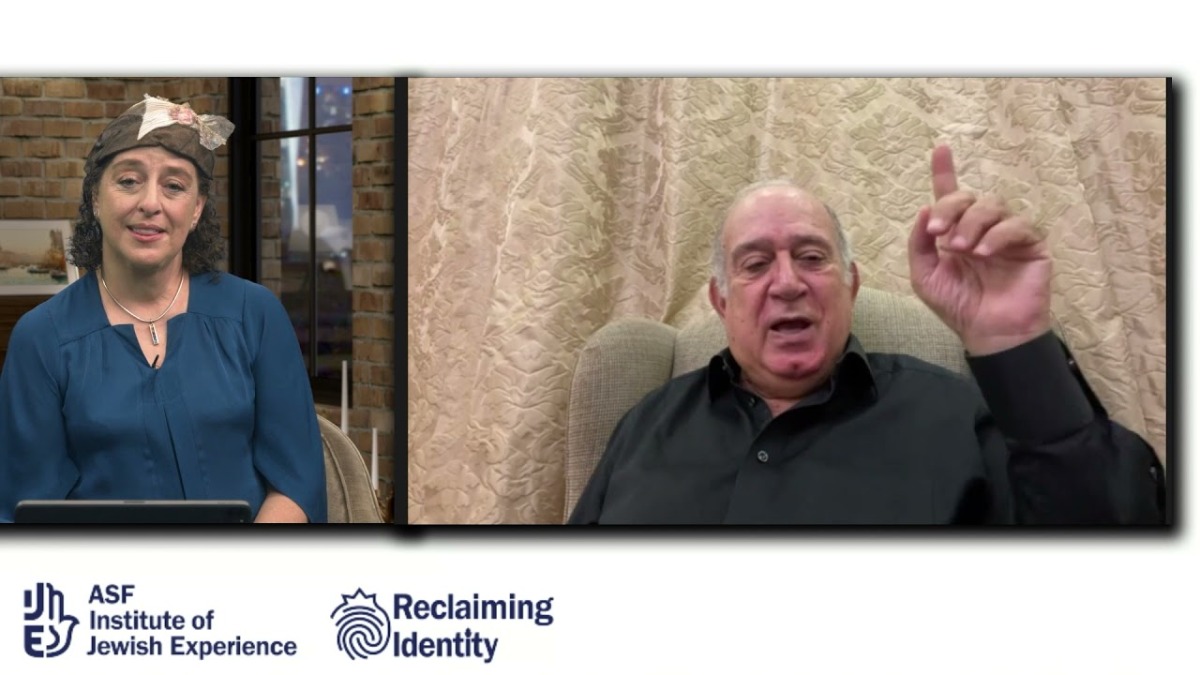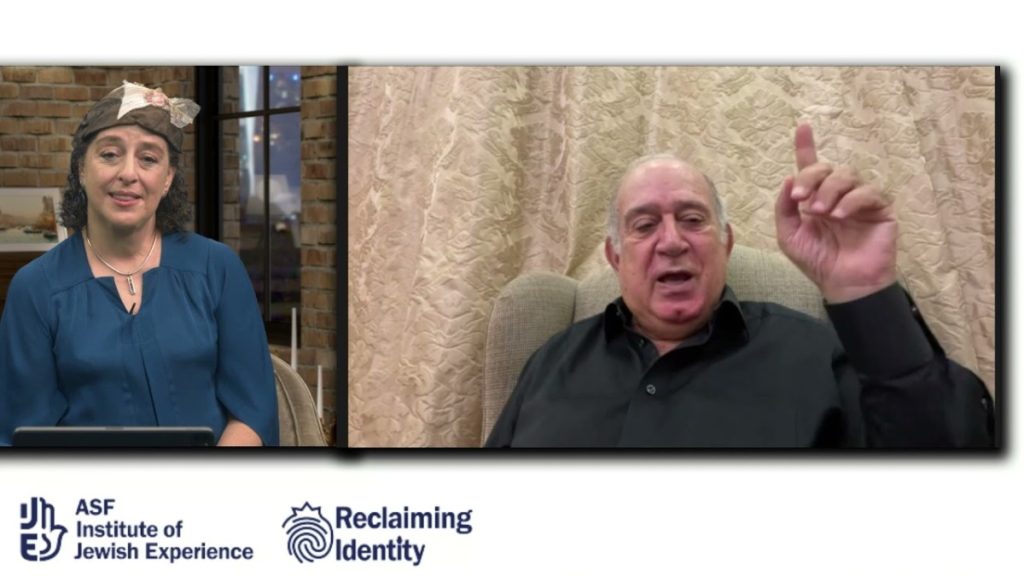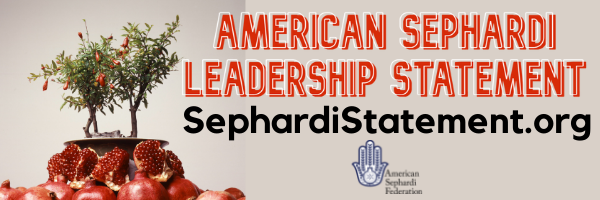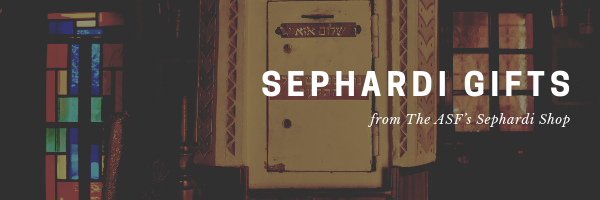Birthplace of the Brotherhood: Understanding & Overcoming Islamism in Egypt

31 May 2022
In special recognition of Albert Ibrahim Bivas, A”H, one of last of a generation of Sephardic Jews who experienced cosmopolitan life in pre-revolutionary Egypt. As both a tribute and continuation of Albert’s legacy with the American Sephardi Federation, his sister, Viviane El-Yachar, and the ASF have created the “Albert Ibrahim Bivas Endowment Fund for the ASF’s National Sephardic Library & Archives” with an initial endowment of $100,000 to support the operations of the library: acquisitions, processing, preservation, and conservation of new collections, including the Bivas – Eliachar Family Collection. This extraordinary collection of books, documents, photographs, ceramics, jewelry, other artifacts, and memories will serve as the basis for a planned exhibition. Please be in touch with us here if you are interested in learning more.
Click here to dedicate a future issue in honor or memory of a loved one

The American Sephardi Federation’s Sephardi Ideas Monthly is a continuing series of essays and interviews from the rich, multi-dimensional world of Sephardi thought and culture that is delivered to your inbox every month.
The May edition of Sephardi Ideas Monthly features an original interview with the liberal Egyptian thinker and writer, Tarek Heggy. A fierce critic of religious extremism and baseless ethnic hatreds, Heggy’s books and articles candidly investigate spiritual-cultural ills affecting the Arab-Muslim world. Heggy’s criticism, however, is animated by love – love for Egypt’s urban, cosmopolitan past and for the richness implicit in Egyptian history and experience. This visceral bond to Egypt’s liberal heritage informs, in turn, Heggy’s sharp criticism of Political Islam in all of its forms.

Mr. Heggy graciously made time for an interview with Sephardi Ideas Monthly that we open, not with a question, but with a message that Heggy recently emailed to his friends and followers:
Tarek Heggy: I have 30,000 books in my library in several languages with sections that address all fields within the social sciences, humanities, arts and literature.
Not too long ago, a European journalist marveled at one of the largest sections of my library which includes hundreds of books on “religions.”
In response to a question from him, I said: my country, Egypt, is comprised of more than Muslims, so how can I not try to know all I can about each religion?
In 1967, the year I entered the university, an earthquake occurred in my life; the June 5th war. How can I not try to know all that I can about Israel and the Jews?
I immersed myself in the study of the Bible with its two covenants. I studied the history of Christianity, the history of the Egyptian Church, and theological issues. As such, my relationship with my fellow Christians became as it is now.
And I delved into a study of the Torah and other sacred books of the Jews, the history of the Hebrews and the Jews over the last 40 centuries, the miserable history of the Jews in Europe after the Romans expelled them from the Holy Land in 70 CE until the establishment of the State of Israel in 1948, and the history of Israel since its state was established three years following the end of World War II. As a consequence of these intensive studies, my vision of the Jews and of Israel has become different from those who do not know a fraction of what I mentioned.
Sephardi Ideas Monthly: Mr. Heggy, your open spirit reflects an Egyptian heritage that has been pushed aside by the rise of Political Islam. In your critiques of Political Islam, especially in the form of the Muslim Brotherhood, you point to Muhammad Ali’s Egypt (1805-1952) as an alternative. Perhaps you could share with our readers what Muhammad Ali’s Egypt represents for you. What has been lost?
TH: Go back to the Napoleonic conquest at the end of the 18th century. Egyptians were deeply impressed by the new technical wonders that had been developed in France and Europe. Local observers compared Western technological progress with their own condition, and they knew they had much to learn. Muhammad Ali’s Egypt accordingly looked northwest.
Muhammad Ali and his successors did two things simultaneously: they sent hundreds of Egyptians to study things like modern engineering techniques and irrigation systems in Europe, and they employed hundreds of European experts in all Egyptian government departments. Egypt wanted to become open and modern. Amazingly, the first Prime Minister in Modern Egypt was an Armenian, Noubar Pasha (1825-1899).
For me, as person who devoted his life and work to advocate for modernity, I can’t be but impressed by this facet of Muhammad Ali’s Egypt.
However, this openness was aborted by Gamal Abdel Nasser, who aimed to direct the Egyptian mind from the West to pan-Arabism. Then came Anwar Sadat, who opened Egyptian society and culture to Islamist influence.
Currently, the influence of Islam on the Egyptian mindset is undeniably the number one influence.
SIM: Your critical remark about Sadat refers to an often-overlooked aspect of his time in power. Outside of Egypt, Sadat is usually remembered as a brave peace-maker who was tragically assassinated. Your assessment of Sadat is more complex.
.
TH: Six years ago, after her speech to the British parliament, I shared with Mrs. Sadat my multi-layered judgment of Anwar Sadat.
Sadat, undeniably, did very well in the October 1973 war with Israel, a war against an army that was much more powerful than his. Without this step, Sadat wouldn’t have been able to do what he did in November 1977 and reach out to Israel. Thanks to that move, Sadat then returned Sinai to Egypt after it was occupied in June, 1967.
However, while Nasser banned the Muslim Brotherhood, Sadat let the Brotherhood operate in the shadows. Sadat didn’t recognize the Brotherhood, but he tried to use them for various political purposes. This de-facto alliance with the Muslim Brotherhood allowed the Brotherhood to grow, and it was a curse that Egypt still suffers from.
SIM: Yes, and the Muslim Brotherhood actually assumed power in Egypt from 2012-13, until they were ousted by General Abdel Fattah al-Sisi following the mass public protests of July, 2013.
Since taking over, President al-Sisi has pushed back against Political Islam and, as you like to point out, has called for the renewal of religious discourse in Egypt. While al-Sisi’s anti-Islamist program is part of the larger regional pushback against Political Islam, he faces enormous challenges, as the forces of Islamism in Egypt remain very strong. How do you assess al-Sisi’s situation?
TH: President al-Sisi is the first Egyptian political leader to speak about the imperative need to renew the religious discourse. In my opinion, this is precisely what Egypt currently needs before anything else. President al-Sisi is the first head of a state to speak about the necessity of renewing the religious context.
It is quite obvious that the Islamic institutions in general and al-Azhar University in particular have rejected this call. As far as al-Azhar, it advocates what could be described as an alloy of the three Islamist contexts: the Wahhabi, the Salafi and the Ikhwani (Muslim Brotherhood) contexts. For the sake of perspective, you must remember, nearly a quarter of all Egyptian students receive an Islamic education in schools managed by al-Azhar.
Personally, I believe that President al-Sisi has been very wise in avoiding a societal conflict about this subject. Meanwhile, I do see that there are quantitative changes that might ultimately help him achieve his goal, totally or partially, while avoiding an undesired clash with al-Azhar.
SIM: Your criticism of al-Azhar is notable. Some argue that the Grand Sheikh of al-Azhar, Dr. Ahmad al-Tayeb, played an important role in defeating the Islamists and extremists after al-Sisi took power. That said, there are anti-Islamist intellectuals like yourself who maintain that al-Azhar remains a very problematic institution.
The Muslim Brotherhood has been outlawed again in Egypt, but do the Islamists still have a following at al-Azhar?
TH: I certainly oppose the current role played by al-Azhar in Egyptian society. Al-Azhar continues to endeavor to set THE TERMS OF REFERENCE with regard to ALL political, cultural and societal dimensions of our national life. This role that al-Azhar continues to seek is undeniably supported by Dr. Ahmed al-Tayeb. Despite the fact that al-Azhar is not formally related to the Wahhabi, the Salafi, and Ikhwani (Muslim Brotherhood) streams, they all have common strategic goals. Political Islam movements are different ONLY tactically, yet they are strategically THE SAME ANIMAL. All of these movements, organizations and groups ultimately aim at an Islamic State that combines all the world’s Muslims and applies constitutional & legal systems based on al-Shari’a (Islamic law).
I should also note that it is quite well known that both al-Azhar and its current Sheikh have never supported Egypt’s President call to modernize religious education.
SIM: Your last point about modernizing religious education is a helpful segue to our final question. How is it possible to shape the future of Egyptian culture when the forces of Political Islam are so deeply entrenched in Egyptian society?
Heggy: My forty-year study of Political Islam in general and in Egypt in particular lead me to believe that saving the collective Egyptian mindset from the plague of Political Islam requires hard work that aims for short term results and, at the same time, for a long-term outcome.
While the most effective tool for the long-term goal is education, the powerful tool for short-term results is THE MOSQUE & THE PREACHERS. Egypt has some 200,000 Mosques that, altogether per year, witness between 10-11 million Friday sermons.
It’s an unrivaled platform that can be used for the most destructive or constructive ends.
Sephardi Ideas Monthly: Thank you
Click here to read Tarek Heggy’s extended historical-theological essay, “Islamism and Modernity: an Unconventional Perspective”
Click here to watch Tarek Heggy as he offers an Egyptian perspective at “Reclaiming Identity: Jews of Arab Lands and Iran Share Stories of Identity, Struggle, and Redemption,” a first of its kind global event created by the ASF’s Institute of Jewish Experience
~~~~~~~

The American Sephardi Federation invites all individuals, communities, and organizations who share our vision & principles to join us in signing the American Sephardi Leadership Statement!
Please also support the ASF with a generous, tax-deductible contribution so we can continue to cultivate and advocate, preserve and promote, as well as educate and empower!
Make checks payable to “American Sephardi Federation” @ 15 West 16th Street, New York, NY, 10011.
Email us at info@americansephardi.org if you are interested in discussing donating securities or planned giving options with a financial professional from AllianceBernstein.
~~~~~~~

The Monthly Sage החכם החודשי

The sage for the month of May 2022 is Hakham Moshe Dayan (1931-1979).
Born in Cairo, Egypt, in 1931, young Moshe studied at a yeshiva led by Hakham Ovadia Yosef, who was then serving in Cairo as Head of the Rabbinical Court.
Hakham Moshe moved to Paris in 1952, studying at a rabbinic seminary and receiving ordination from the Chief Rabbi of France at the time, Rabbi Yaakov Kaplan. Following his ordination, Hakham Moshe served as Rabbi of Northern France and in the French army. He also married Rivka; together they had ten children.
In 1963 the family made Aliyah to Israel and settled in the city of Holon, where Hakham Moshe taught Torah at different Yeshivot. In 1972, Hakham Moshe relocated to serve as rabbi of the Egyptian-Jewish Mekor Hayim community in Sao Paulo, Brazil. Hakham Moshe established a Talmud Torah, oversaw the building of a mikvah (ritual bath), and supervised local kashrut.
Hakham Moshe Dayan passed away from an illness, too young, on 21 Iyar 5739 (1979), at the age of 48. He was buried at the Mount of Olives cemetery in Jerusalem.
Hakham Moshe’s book, Likutei Hemed, presents Jewish Law to the general religious public according to the weekly Torah portions. Hemdat Moshe, a collection of Torah articles by various writers (including Hakham Moshe) was published in Hakham Moshe Dayan’s memory.
In the following passage from Likutei Hemed, Hakham Moshe offers advice to parents and tutors (and teachers) regarding education:
One should hire a clever tutor who is familiar with the ways of teaching children according to their nature, and who will be very precise, for the version learned in childhood is not forgotten. He should also… supervise the children and prevent them from any unsightly or forbidden acts…
Also, should one realize that the tutor does not behave as he should or that his teaching is inadequate, one should withdraw one’s child from his hold and place him with another tutor, and not take pity on the tutor because of his income, for in so doing one is being cruel to his child as well as sinning towards God…
The tutor… should clarify biblical texts in depth, in keeping with (the children’s) abilities and understanding, so that Scripture not be learned like a mere song whose recitation they do not understand; when he translates Bible into the local language, he should take care to be precise in his language and to be exact in all instances, as required…
~~~~~~~

From Generation to Generation: a Legacy of Faith and Tolerance
By David S. Malka
From Generation to Generation: a Legacy of Faith and Tolerance is dedicated to the memory of Rabbi Shlomo Malka. It honors his memory as a Jewish scholar, a spiritual leader, and a great humanitarian.
David S. Malka is publishing this text as his personal contribution to legacy of Malka family, in the hope that this generation will re-discover their patriarch’s teaching and advance his message of faith and compassion on to the next generation.
From Generation to Generation: a Legacy of Faith and Tolerance is a message of love, tolerance, and pride in one’s heritage.
Jewish Women from Muslim Societies Speak
Published by the American Sephardi Federation and Hadassah International Research Institute on Jewish Woman at Brandeis University
Jewish women from Morocco, Egypt, Turkey, Lebanon, and Iran were invited to share their personal stories. It could be said that these women’s voices are from the last generation of Jews to have an intimate personal knowledge of the Muslim world, the enormous diversity within and among Middle Eastern Jewish communities.
We hope that these essays, told through the medium of vivid personal stories, will stimulate discussion about contemporary dynamics in the Muslim world and raise awareness of Jewish women’s history in North Africa and the Middle-East.
~~~~~~~
Upcoming Events or Opportunities
The ASF Institute of Jewish Experience presents:
New Works Wednesday with Arnon Z. Schorr and Joshua Edelglass
Join us for this episode of New Works Wednesdays with Arnon Z. Schorr and Joshua Edelglass as they discuss their new book “José and the Pirate Captain Toledano”!
Wednesday, 1 June at 12:00PM EST
(Complimentary RSVP)
Sign-up Now!

About the book:
Set in the shadows of the Spanish Inquisition, this is the coming-of-age story of José Alfaro, a young refugee who forms a powerful bond with the mysterious Pirate Captain Toledano. It’s also a dynamic pirate adventure on the high seas, with hand-to-hand combat and ship-to-ship action, and the powerful story of a dark time in history when people took different paths to survive.
About the authors:
Arnon Z. Shorr, a filmmaker and screenwriter, loves telling stories. Half-Sepharadi / half-Ashkenazi, a Hebrew speaker in America, a Jewish private-school kid in a mostly non-Jewish suburb, whenever he’d set foot in one world, his other foot would betray him as different. That’s why he tells stories that embrace the peculiar and the other. For more about Arnon, visit www.arnonshorr.com. Formerly of Los Angeles, he lives in Boston.
Joshua Edelglass’ work has appeared in publications including Tikkun Magazine, and The New Haven Review. His artwork has also appeared in numerous exhibitions, including Pow! Jewish Comics Art and Influence at the Brooklyn Jewish Art Museum. He has watched Star Trek II more times than is probably healthy. For more information about Josh, visit www.MotionPicturesComics.com. He is the Assistant Director of Camp Ramah New England and lives near Boston.
Click here for more about the book.
Sponsorship opportunities available:
info@americansephardi.org
===
The ASF Institute of Jewish Experience presents:
New Works Wednesday with Sharon Shalom
Join us for New Works Wednesday with Rabbi Dr. Sharon Shalom who will discuss his new book “Dialogues of Love and Fear: A Rabbi’s Daughter, a Kes’s Son, and Hope for the Future.”
Wednesday, 8 June at 12:00PM EST
(Complimentary RSVP)
Sign-up Now!

About the book:
“Dialogues of Love and Fear” is a work of imagination and insight that addresses fraught issues of our times in new and refreshing ways. The author, whose own dramatic life journey has taken him from shepherd to professor, from refugee to IDF officer, and from student of a kes (religious leader) to rabbi of an Ashkenazi synagogue, brings the many facets of his identity into dialogue in these brilliantly imagined conversations between two characters. Through them it provides a window into the world of Ethiopian Jewry, their challenges, and the deep questions that every complex relationship carries with it. Covering a huge breadth of topics, this heart-warming, optimistic book offers a transformative perspective that is tolerant, accessible, and committed to Jewish tradition.
About the speakers:
Rabbi Dr. Sharon Shalom made aliyah to Israel on his own in 1982 at the age of eight under Operation Bat Galim, operated by the Mossad and the IDF commandos. Rabbi Sharon Shalom received his PhD in Jewish philosophy from Bar-Ilan University and his rabbinic ordination from Yeshivat Har Etzion in Gush Etzion. Today he serves as rabbi of Congregation Kedoshei Yisrael in Kiryat Gat. He currently serves as a lecturer at Orot Yisrael College in Elkanah and at Bar-Ilan University. Dr. Shalom lives with his wife, Avital, and their five children in Kiryat Gat.
Steven Fine (born 1958), historian of Judaism in the Greco-Roman World, is professor of Jewish History at Yeshiva University in New York, director of the Arch of Titus Digital Restoration project and of the Yeshiva University Center for Israel Studies, and a founding editor of-Images: A Journal of Jewish Art and Visual Culture.
Click here for more about the book.
Sponsorship opportunities available:
info@americansephardi.org
===
The ASF Institute of Jewish Experience presents:
New Works Wednesday with Haim Jachter
Join us for New Works Wednesdays with Rabbi Haim Jachter as he discusses his new book “Bridging Traditions: Demystifying Differences Between Sephardic and Ashkenazic Jews.”
Wednesday, 22 June at 12:00PM EST
(Complimentary RSVP)
Sign-up Now!

About the book:
As the rabbi of a Sephardic synagogue for over twenty years who is himself of Ashkenazic descent and trained in Ashkenazic yeshivot, Rabbi Haim Jachter has a unique vantage point from which to observe the differences in customs and halachot between Ashkenazim and Sephardim. In Bridging Traditions, Rabbi Jachter applies his wide-ranging expertise to explicating an encyclopedic array of divergences between Ashkenazic and Sephardic halachic practice, while also capturing the diversity within different Sephardic communities. Bridging Traditions is essential reading for Jews of all origins who are interested in understanding their own practices and appreciating those of their brethren, and in seeing the kaleidoscope of halachic observance as a multi-faceted expression of an inner divine unity.
About the speaker:
Rabbi Haim Jachter is the rabbi of the Sephardic Congregation of Teaneck. He serves as a Dayan on the Beth Din of Elizabeth and has acquired an international reputation of excellence in the area of Get administration. He is also teacher at Torah Academy of Bergen County. He is a member of the Rabbinical Council of America’s Halacha Committee and Chairman of its Igun Resolution Committee. He is frequently sought out to assist communities in establishing and managing their Eruvin, and is the Rav HaMachshir of our eruv. Rabbi Jachter’s ordination is from Yeshiva University where he also earned his Master’s degree in Jewish Philosophy.
Click here for more about the book.
Sponsorship opportunities available:
info@americansephardi.org
===
The ASF Institute of Jewish Experience presents:
New Works Wednesday with Mark Schneegurt
Join us for this episode of New Works Wednesdays where Mark Schneergurt discusses “Anthology of Religious Poetry from the Mexican Inquisition Trials of 16th-Century CryptoJews.”
Wednesday, 29 June at 12:00PM EST
(Complimentary RSVP)
Sign-up Now!

About the book:
A century after being expelled from Portugal, cryptoJews in Mexico, false converts to Christianity, could not speak of their beliefs for fear of becoming embroiled in the imprisonment, torture, and death in flames that characterized the Inquisition. Without written texts, the Jewish liturgy lost, clans of cryptoJews created a unique body of religious poetry, connecting them to the Laws of Moses, seeking redemption from sin, or hoping for an escape from their embittered lives. The Carvajal clan was led by Luis el Mozo, an alumbrado, a mystic, and his Judaizing sisters. Once discovered to be secretly practicing Judaism, years of suffering at the hands of the Inquisitors were meticulously recorded in the transcripts of their long demeaning trials. The Carvajal’s friends, spouses, children and grandchildren were implicated as Judaizers, with many being reconciled by the Church to secular authorities to be burned alive at massive public ceremonies. The burning of Luis and his sisters was the main attraction for cheering crowds at the auto de fé of 1596 in Mexico City. The cruelty of the Inquisitors was matched by their attention to legal detail and testimonies made at trial. Buried within thousands of pages of transcripts, hiding in library special collections of rare books around the world are the only remnants of the religious poetry that sustained cryptoJews hiding in Mexico. Anthology uncovers these hidden treasures!
About the author:
Mark A. Schneegurt is an author, educator, scientist, and entrepreneur. His books range from scholarly works on science, religion, and literature to popular books on The Beatles. He has authored 80+ publications and has made 200+ public presentations of his works.
Sponsorship opportunities available:
info@americansephardi.org
===
The ASF Institute of Jewish Experience presents:
New Works Wednesday with Joyce Yarrow
Join us for New Works Wednesdays with Joyce Yarrow discussing her new book “Zahara and the Lost Books of Light”!
Wednesday, 6 July at 12:00PM EST
(Complimentary RSVP)
Sign-up Now!

About the book:
Seattle journalist Alienor Crespo travels to Spain to claim the promise of citizenship offered to the descendants of Jews expelled from Spain in 1492. As she relives history through her vijitas (visits) with her ancestors, Alienor also confronts modern-day extremism and commits herself to protecting an endangered “Library of Light” – a hidden treasure trove of medieval Hebrew and Arabic books, saved from the fires of the Inquisition.
About the author:
The author of five novels, Joyce Yarrow was born in the SE Bronx, escaped to Manhattan as a teenager, and today does most of her traveling through her writing.
Joyce has worked as a screenwriter, singer-songwriter, multimedia performance artist, and member of the world music vocal ensemble, Abráce.
She is a Pushcart nominee, whose stories and poems have been widely published. She considers the setting of her books to be characters in their own right and teaches workshops on “The Place of Place in Suspense Writing.”
Click here for more about the book.
Click here for the Spanish edition.
Sponsorship opportunities available:
info@americansephardi.org
===
The Greek Jewish & Sephardic Young Professionals Network in partnership with the Association of Friends of Greek Jewry present:
Special Young Professionals Tour of Jewish Greece
(Summer 2022)
Join to trace the roots of our families, visit the beautiful cities of Thessaloniki (Salonika), Veroia, Kastoria, Ioannina, Athens, and Rhodes, and connect with other young Jews in Greece.
Check out the full itinerary here!

For more information email GreekJewishYPN@gmail.com